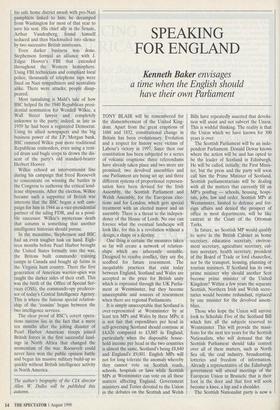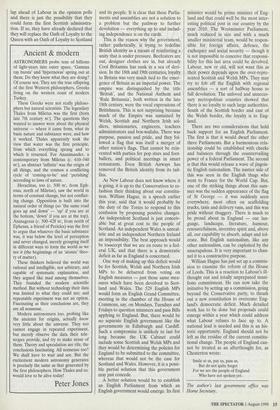SPEAKING FOR ENGLAND
Kenneth Baker envisages a time when the English should have their own Parliament TONY BLAIR will be remembered for the dismemberment of the United King- dom. Apart from the great eruptions of 1688 and 1832, constitutional change in Britain has been evolutionary. Evolution and a respect for history were victims of Labour's victory in 1997. Since then our constitution has been subjected to a series of volcanic eruptions: three referendums have already taken place and two more are promised; two devolved assemblies and one Parliament are being set up; and three different systems of proportional represen- tation have been devised for the Irish Assembly, the Scottish Parliament and Welsh Assembly, for the European elec- tions and for London, which gets special treatment with an elected mayor and an assembly. There is a threat to the indepen- dence of the House of Lords. No one can foresee what the eventual landscape will look like, for this is a revolution without a design, a shape or a destiny.
One thing is certain: the measures taken so far will create a network of relation- ships which are inherently unstable. Designed to resolve conflict, they are the seedbed for future resentment. The inequitable practices that exist today between England, Scotland and Wales are accepted as the price for British unity which is expressed through the UK Parlia- ment at Westminster, but they become unacceptable and sources of resentment when there are regional Parliaments.
It is simply unacceptable that Scotland is over-represented at Westminster by at least ten MPs and Wales by three MPs; it is not fair that expenditure per head in self-governing Scotland should continue at £4,826 compared to £3,885 in England, particularly when the disposable house- hold income per head in the two countries is almost the same, Scotland's being £8,840 and England's £9,001. English MPs will not for long tolerate the anomaly whereby they cannot vote on Scottish roads, schools, hospitals or laws while Scottish MPs at Westminster can vote on all these matters affecting England. Government ministers and Tories devoted to the Union in the debates on the Scottish and Welsh Bills have repeatedly asserted that devolu- tion will assist and not subvert the Union. This is wishful thinking. The reality is that the Union which we have known for 300 years is over.
The Scottish Parliament will be an inde- pendent Parliament. Donald Dewar knows where the action will be and has opted to be the leader of Scotland in Edinburgh. He will be called, initially, the First Minis- ter, but the press and the party will soon call him the Prime Minister of Scotland. Scottish parliamentarians will be dealing with all the matters that currently fill an MP's postbag — schools, housing, hospi- tals, jobs, law and order. Scottish MPs at Westminster, limited to defence and for- eign affairs and denied the prospect of office in most departments, will be like castrati at the Court of the Ottoman Turks.
In future, no Scottish MP would qualify to serve in the British Cabinet as home secretary, education secretary, environ- ment secretary, agriculture secretary, cul- ture secretary, health secretary, president of the Board of Trade or lord chancellor, nor be the transport, housing, planning or tourism ministers. If Scotland has its own prime minister why should another Scot become prime minister of the United Kingdom? Within a few years the separate Scottish, Northern Irish and Welsh secre- taries would become redundant, replaced by one minister for the devolved assem- blies.
Those who hope the Union will survive look to Schedule Five of the Scotland Bill which lists all the subjects reserved to Westminster. This will provide the mani- festo for the next ten years for the Scottish Nationalists, who will demand that the Scottish Parliament should take control over all of these matters, such as North Sea oil, the coal industry, broadcasting, lotteries and freedom of information. Already a representative of the Edinburgh government will attend meetings of the European Union in Brussels: that is their foot in the door and that foot will soo'n become a knee, a hip and a shoulder.
The Scottish Nationalist party is now a lap ahead of Labour in the opinion polls and there is just the possibility that they could form the first Scottish administra- tion. If so, they have already declared that they will replace the Oath of Loyalty to the Queen with an Oath of Loyalty to Scotland and its people. It is clear that these Parlia- ments and assemblies are not a solution to a problem but the pathway to further devolution — everything up to and includ- ing independence is on the cards.
This is the reason why the government, rather pathetically, is trying to redefine British identity as a means of reinforcing a unity that is under pressure. Beefeaters are out, designer clothes are in, but already Cool Britannia has sunk in a sea of deri- sion. In the 18th and 19th centuries, loyalty to Britain was very much tied to the emer- gence of Britain as an imperial power. The empire was distinguished by the title 'British', and the National Anthem and 'Rule Britannia', both written in the late 18th century, were the vocal expressions of Britishness. This is not surprising because much of the Empire was sustained by Welsh, Scottish and Northern Irish sol- diers, missionaries, engineers, teachers administrators and box-wallahs. There was purpose, passion and pride, and they fol- lowed a flag that was itself a merger of other nation's flags. That cannot be rein- vented with parties for pop stars and foot- ballers, and political meetings in smart restaurants. Even British Airways has removed the British identity from its tail- fins.
As New Labour does not know where it is going, it is up to the Conservatives to re- fashion their thinking about our constitu- tion. William Hague, in a speech earlier this year, said that it would probably be the duty of the Tories to respond to this confusion by proposing positive changes. An independent Scotland is just conceiv- able but at great cost to the people of Scotland. An independent Wales is unreal- istic and an independent Northern Ireland an impossibility. The best approach would be toaaccept that we are en route to a fed- eral UK, and that there is a democratic deficit as far as England is concerned.
One way of making up this deficit would be for Scottish, Welsh and Northern Irish MPs to be debarred from voting on English measures — just those same mea- sures which have been devolved to Scot- land and Wales. The 529 English MPs would form an English Grand Committee, meeting in the chamber of the House of Commons, say, on Mondays, Tuesdays and Fridays to question ministers and pass Bills applying to England. But, there would be no separate English government like the governments in Edinburgh and Cardiff. Such a compromise is unlikely to last for long because the UK Cabinet could include some Scottish and Welsh MPs and they would be determining the policies for England to be submitted to the committee, whereas that would not be the case for Scotland and Wales. However, it is a possi- ble partial solution that this government may just concede.
A better solution would be to establish an English Parliament from which an English government would emerge. Its first minister would be prime minister of Eng- land and that could well be the most inter- esting political post in our country by the year 2010. The Westminster Parliament, much reduced in size and with a much smaller ministerial team, would be respon- sible for foreign affairs, defence, the exchequer and social security — though it is not impossible to conceive that responsi- bility for this last area could be devolved. Labour, new or old, will not want this as their power depends upon the over-repre- sented Scottish and Welsh MPs. They may try to fob off the English with regional assemblies — a sort of halfway house to full devolution. The unloved and unneces- sary metropolitan counties showed that there is no loyalty to such large authorities. South of the Scottish border and east of the Welsh border, the loyalty is to Eng- land.
There are two considerations that hold back support for an English Parliament. The first is that it would dwarf the other three Parliaments. But a harmonious rela- tionship could be established with checks and balances through the countervailing power of a federal Parliament. The second is that this would release a wave of jingois- tic English nationalism. The nastier side of this was seen in the English thugs who went to France for the World Cup. But, one of the striking things about this sum- mer was the sudden appearance of the flag of St George — it was suddenly seen everywhere, most often on scaffolding trucks, taxis and delivery vans, and this was pride without thuggery. There is much to be proud about in England — our lan- guage, landscape, literature, humour, resourcefulness, inventive spirit and, above all, our capability to absorb, adapt and tol- erate. But English nationalism, like any other nationalism, can be exploited by the unscrupulous. It is very important to chan- nel it to a constructive purpose.
William Hague has just set up a commis- sion to examine the reform of the House of Lords. This is a reaction to Labour's ill- thought out and totally unprepared mani- festo commitment. He can now take the initiative by setting up a commission, going beyond the Conservative party, to thrash out a new constitution to overcome Eng- land's democratic deficit. Much detailed work has to be done but proposals could emerge within a year which could address what Labour refuses to face up to. A national lead is needed and this is an his- toric opportunity. England should not be left as the residue of the current constitu- tional change. The people of England can- not be treated as an afterthought for, as Chesterton wrote: Smile at us, pay us, pass us, But do not quite forget For we are the people of England
Who have not spoken yet.
The author's last government office was Home Secretary.



























































 Previous page
Previous page